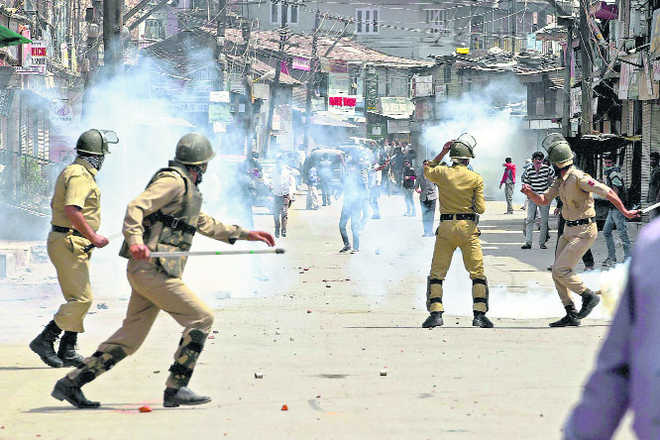
Angry youth: The hopes of the stone-pelting students remain unfulfilled.
Gurmeet Kanwal
Former director, Centre for Land Warfare Studies (CLAWS), New Delhi
Speaking in the Rajya Sabha on the extension of President’s rule in Jammu and Kashmir (J&K), Home Minister Amit Shah blamed Jawaharlal Nehru for having erred in taking the Kashmir issue to the United Nations and accepting a ceasefire to be followed by a plebiscite to ascertain the will of the people to decide the future of Kashmir. In keeping with the BJP’s stand, Shah has stated several times that Articles 35-A and 370 of the Indian Constitution, by means of which the accession of J&K to India was formalised and the state was given a special status, were also a mistake and, in any case, should have been abrogated many years ago.
While the Home Minister is perhaps right on both counts — many historians and analysts disagree — a political solution to resolve the Kashmir problem cannot now be imposed by India unilaterally on the people of J&K who are coequal stakeholders. A political solution has to be negotiated with the elected representatives of the people of the state and their sense of alienation from the national mainstream has to be addressed. As the Home Minister agrees, their hearts and minds have to be won over.
The security situation in the Kashmir Valley has continued to remain under control over the last decade with tension simmering just below the surface and sometimes erupting into violence, but over short durations. However, it could easily boil over into large-scale violence being triggered by a relatively minor incident that is perceived by the people as a transgression of their human rights or religious freedom. The resultant wave of violence would leave the Indian Government facing an explosive situation that may resemble other movements or even revolutions in recent memory.
In February 1986, the Filipino people restored democracy through the People Power Revolution. In 1989-90, Lech Walesa’s Solidarity Movement in Poland beat back the mighty Soviet Union’s tanks. The citizens of Czechoslovakia shook off totalitarian communist rule in the Velvet Revolution. The victory of the Ukrainian people’s Orange Revolution represented a new landmark in the history of people’s movements for democracy. The Cedar Revolution in April 2005 ended the Syrian military occupation of Lebanon after 30 years. The Nepalese revolution next door was another manifestation of the power of the people. This month, protesters in Hong Kong occupied the legislative assembly building and blocked roads for several days.
Clearly, there is a lesson in this for India. If some of the disaffected Kashmiri youth come out on the streets of Srinagar, Baramulla, Sopore, Kupwara, Anantnag and half a dozen other towns like they did in 1988-89, in today’s mega-media age that is dominated by the social media, it will be almost impossible to keep Kashmir by force as international human rights watchdogs and NGOs begin to scream murder. Brought up during two decades of violence under the shadow of the guns of the security forces as well as the terrorists, the hopes of the stone-pelting students remain unfulfilled. They are educated and they are jobless. And, they are angry. While some of these protesters are no doubt being paid to shout slogans demanding azadi and hurl stones at the security forces, many of them are genuinely concerned about the lack of resolution of the core issues and the government’s inability to resolve the socio-economic challenges facing the state.
It is not that governments in power in Delhi have not tried. Former Prime Minister Atal Bihari Vajpayee had expressed himself in favour of negotiations under the ambit of Jamhooriyat, Insaniyat and Kashmiriyat. Ex-PM Manmohan Singh had realised that it was time to deliver in Kashmir and had come out strongly in favour of a healing touch. He has spoken of feeling the people’s ‘dard aur mayusi’ and had expressed his anguish over the killings in the Kashmir Valley.
Loose talk of abrogating Article 370 of the Indian Constitution — the glue that binds the Constitutions of J&K and India — continues unfettered. Except for a very small minority that has been deeply influenced by radical extremism, the Kashmiri people do not wish to either join Pakistan or opt for independence from India, despite the slogans being shouted by stone-pelters in recent years. Creeping Talibanisation in Pakistan goes against the grain of Kashmiriyat and Sufi culture and it has not gone unnoticed.
It is my conviction that after very hard and acrimonious bargaining, the Kashmiri people will ultimately settle for unadulterated autonomy, which will allow them the right to rule themselves, within the Indian Union. They will accept that the central government continues to deal with defence, foreign affairs, currency and communications while the J&K Assembly is left free to legislate on everything else. This should not be viewed as an out-of-the-way concession as federalism forms the basis of the Indian Constitution. If some sections of the Indian polity think that it is too much to concede, they need to consider the alternatives — each of which is too horrible to contemplate.
The late Prime Minister Narasimha Rao had said the ‘sky is the limit’ for autonomy. When asked whether he was proposing to hold talks within the framework of the Constitution, Vajpayee had said he was willing to host talks within a ‘humanitarian framework’. Manmohan Singh had made a pitch for ‘mutual tolerance, understanding and accommodation’ in his first term.
All-party talks must be held to evolve a national consensus on resolving the problem in J&K. As for security forces, they must be allowed to conduct their counter-insurgency operations against Pakistan-sponsored terrorists in accordance with the well established rules of engagement, but must do so with a sense of utmost restraint. It is time to stop inflaming passions on vote bank-based party lines of the past and to act in a statesman-like manner in the national interest. The integrity of India as a nation-state must remain inviolable.


























